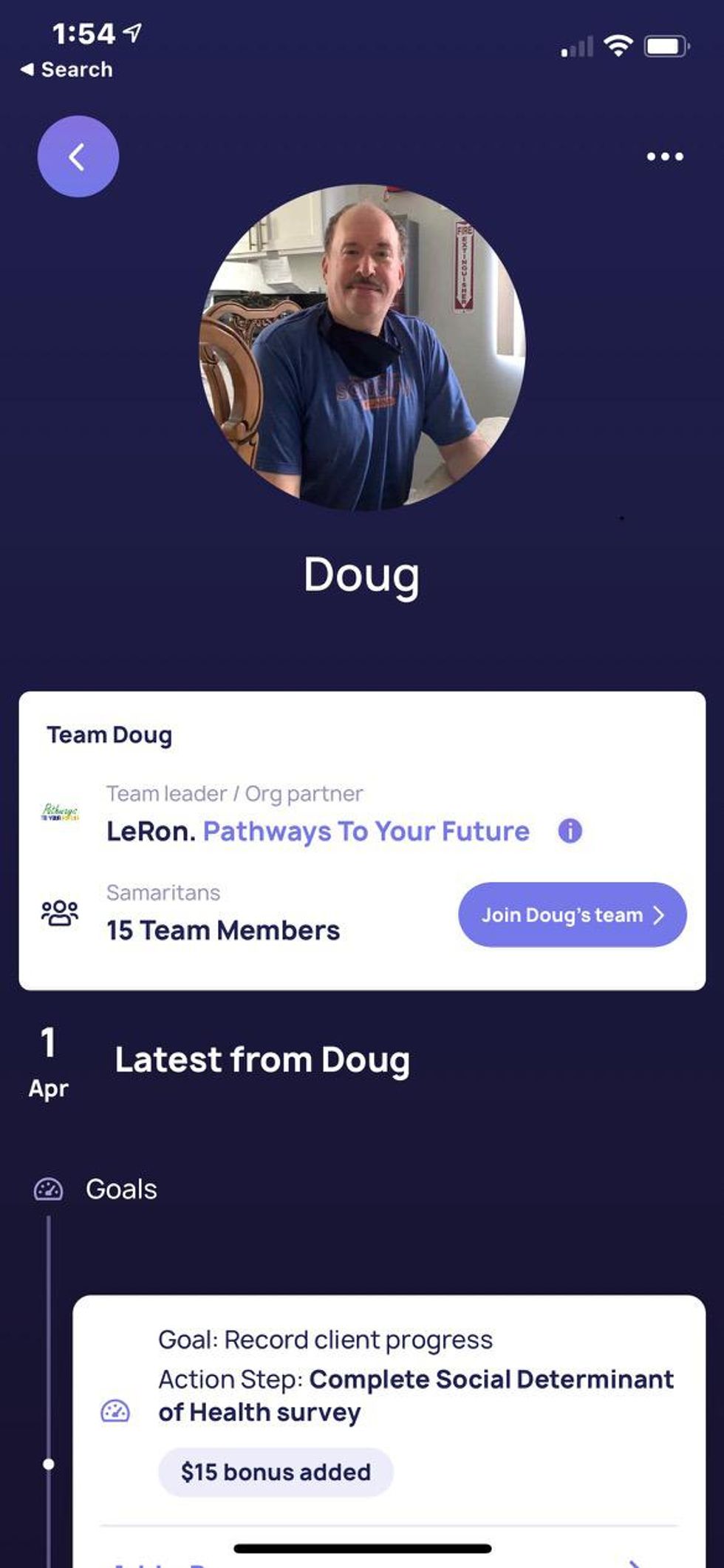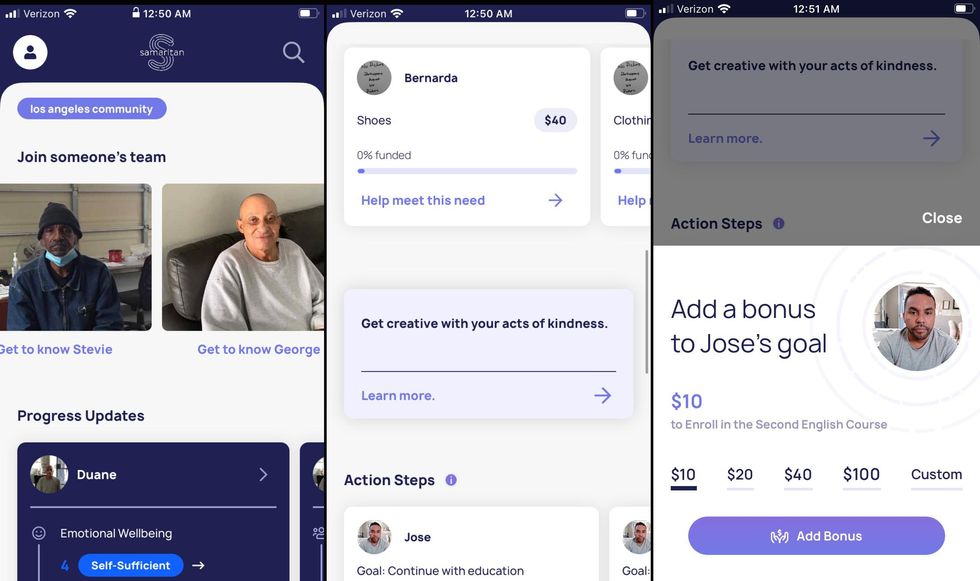Days after Doug Weber signed up for the Samaritan app at the suggestion of his case worker, he received his first donations — about $80 in total.
Weber found himself homeless in L.A. for six years after he says he was jilted by a business partner who ran away with his savings. He then found himself at the mercy of several persistent health problems. He was able to find temporary housing through a local nonprofit and get set up to receive food stamps, but for anything else, he relied on the kindness of strangers.
"I bought simple things. Socks, underwear. I went and bought a good leather belt — instead of a cheap one that you buy in a discount store. That was $25 alone — you know, something that's gonna hold up for a couple years and not fall apart."

The money came courtesy of users on the Samaritan app, a kind of Patreon for people experiencing homeless, or a social app introducing communities to their unhoused neighbors.
After a couple years honing its approach in Seattle, the startup is moving into Southern California, where L.A.'s sizeable homeless population and the tech world overlap, from the boardwalks of Silicon Beach to Downtown's arts district, among other places. The app hopes to grow the relationship between passersby and homeless people, beyond the quick exchange of a few crumpled dollars and a grave nod. It also hopes to give homeless users more agency in telling their story.
Samaritan, a for-profit benefit "B-corp" corporation, is partnering with L.A.-based nonprofit Pathways To Your Future to upload profiles of their homeless clients, including a little bit about their life story, the items they're saving for and their goals. Homeless users can also choose to be anonymous.
Users download the app, enter their city and see profiles of Pathways' clients and those of its other nonprofit partners. From there, they can scroll through profiles and donate money toward items users' need or goals they're trying to hit — everything from groceries to making regular AA meetings. The funds are administered by the partner organization — in this case, Pathways — which Samaritan hopes can help ensure the money (which is delivered through a prepaid PEX debit card) goes toward its intended purpose. One hundred percent of the funds go to the homeless users.
Born in Seattle
Samaritan was created in Seattle in 2015 by entrepreneur and filmmaker Jonathan Kumar. It graduated from Techstars' UnitedHealthcare startup accelerator in 2020, and raised $150,000 in seed funding from Jumpstart Health Investors and Right Side Capital Management. It has also received some grant funding from nonprofits, according to Samaritan spokesman Eric Hunter.
Initially, he said, the app relied heavily on beacon technology that would notify users that they were near someone who was looking for a donation.
"When you walk by a person it will notify you that you've walked by them, and allow you to donate to them, which was a big part of our Seattle pilot," said Hunter.
It was essentially virtual panhandling, which also allowed you to offer some encouragement or a kind word.
"We've since phased it out a little bit," he said.
The company still uses the beacons — a kind of keyfob —to allow homeless users to access their funds, but the app is now more focused on giving users the ability to afford "needs" (such as clothing) or give them a congratulatory boost for "action steps" (such as meeting regularly with a case worker) that the users set themselves.
Bill Greco, who oversees Samaritan's program with Pathways, said the idea isn't really about the immediate cash.
"The goal is to get them self-sufficient," he said. "Mentally, financially, spiritually — if you will — to become independent and circle back into society."
Another goal: Building empathy among the app's users.
"When we tell one story of one person's life struggle, it really changes the perceptions that people have about homelessness," Greco said. "This obviously is not going to solve [homelessness], but I think it's going to change, hopefully, people's perception about what the issue represents — with these individualized struggles."
Greco said Pathways clients have established real relationships through the messaging feature on the app. In some cases, users have gone far beyond cash donations, bringing bikes or art supplies directly to homeless people on the app who list the items among their needs.

A Boost for Nonprofits
Samaritan hopes to license its technology to more nonprofits like Pathways, which pays a fee for access to the app. Hunter said it's been a fairly successful business model so far.
The partnership helps Pathways attract funding and gives its homeless clients a reason to check in regularly.
"It helps differentiate the organization from the hundreds of others that are out there," said Greco.
"What really intrigues me is that the platform gives these people a voice," he said. "You know, these people are somewhat invisible, but the platform allows them to tell their story, to talk about the positive outcomes they want to achieve and to engage with potential donors."
Doug Weber still has medical bills to pay and worries whether he'll be able to afford his rent -- and he's not counting on the app to help him reach those goals.
"It's not life changing money," he said. "But for somebody who's just trying to get back on their feet... where they're living day-to-day and they're trying to save some money — it's a good thing."
- Investing in Tech and a Vision to Strengthen LA's Social Net - dot.LA ›
- An App For California's Homeless and Those Who Help Them - dot.LA ›
- Closegap Wants To Be A Support For Students’ Well Being - dot.LA ›
- Our Community LA Creates App to Help Homeless Find Services - dot.LA ›

